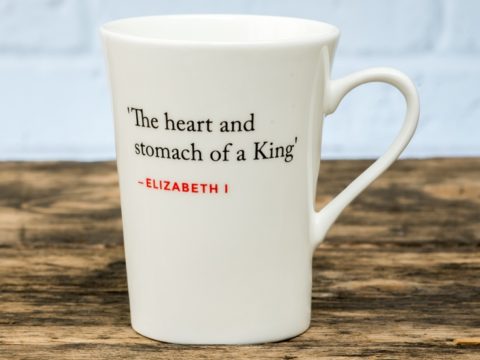Katharine of Aragon: Life Story
Chapter 9 : Motherhood
In February 1516, Katharine finally held a healthy, live child in her arms. Her daughter Mary was born on the 18th of the month and christened a few days later at the Church of the Observant Friars Greenwich. Unlike the Duke of Cornwall, Mary flourished. Katharine’s immediate joy was somewhat alloyed by the news that her father had died in January, information which had been kept from her so as not to endanger the pregnancy.
The birth of a daughter was a positive outcome for Henry in that the baby was clearly healthy and likely to thrive. With his accustomed habit of accentuating the positive, Henry declared that both he and Katharine were young and boys would surely follow.
Royal mothers were not accustomed to undertaking physical care of their children and Katharine was no exception. Mary, being only a daughter, did not merit the independent household an oldest son would have been granted but had a small coterie of dedicated servants – nurses, rockers, serving women and a chaplain-cum-secretary. Mary was frequently with Henry and Katharine, who both took an intense interest in her, but the baby also spent considerable time in the quieter and healthier air of the small palace at Thames Ditton.
Although he still had no son, Henry now had an additional bargaining chip in European politics. With Ferdinand’s death, Charles, Duke of Burgundy, had become King of Castile and Aragon in conjunction with his mother, Queen Juana. Juana remained confined for the rest of her life, allegedly mad, although the symptoms as described appear reminiscent of manic-depression rather than insanity.
In France too, there was a new king, François I. Europe was now ruled by a triumvirate of young men. All three - Henry, Charles and François – sought military glory, which François had found in 1515 at his stunning victory at Marignano which brought the duchy of Milan into his hands.
For Charles, feats of arms would have to wait: the Spanish were unenthusiastic about their new king, who was disliked as a foreigner – he needed time, money, and friends to consolidate his kingship and to position himself to be elected as Emperor when Maximilian died. He was perhaps sorry that he had failed to marry Henry’s sister when he had the opportunity, and alliance with England would be an important part of his policy for the first ten years of his reign.
For Henry, and of course Katharine, alliance with Charles was the preferred strategy. Charles’ Burgundian territories had been England’s most important trading partner for over a hundred years and any disturbance to the trade from war was damaging for both countries. But despite the constant desire to invade France, Henry too was short of money to indulge in a war. The result was that Henry and Wolsey looked to build an alliance with the newly powerful François through the betrothal of Katharine’s daughter to the Dauphin in 1518. As well as monetary motives, Henry could comfort himself that he was acting as a true Christian in promoting the wider five-year truce proclaimed by Pope Leo X, in the (futile) hope of uniting Christendom against the incursions of the Ottoman Empire.
The betrothal took place on 5th October and Mary, who was two and a half, acquitted herself well. Katharine was heavily pregnant, and must have been hoping against hope for a son. As part of the marriage negotiations, Henry had promised to recognise Mary as his heir if he had no son. The last thing Katharine would have wanted was her daughter carrying England into French hands. Alas, in November, Katharine bore another daughter who died either before or immediately after birth.
Of course, in 1518, neither Henry nor Katharine could have known that there would be no more pregnancies, and it appears that they still hoped for another six years. For Henry, there was the bitter-sweet arrival of his illegitimate son, Henry Fitzroy, in 1519 to prove that there was no reason why he should not have a son. In the meantime, Mary, although not formally acknowledged as Henry’s heir, began to receive more attention.
In 1519, Charles of Spain was elected as Holy Roman Emperor. Both François and Henry had put their names forward, and the French king had spent a fortune on bribes, but to no avail. For Charles, the debt he incurred in obtaining an office which in actuality had no land or wealth attached to it made it something of a pyrrhic victory. Nevertheless, the prestige was enormous, and, for Katharine, the knowledge that her nephew was the secular leader of Christendom (in theory, if not in practice) must have added to her sense of the dignity of her own position.
Katharine of Aragon
Family Tree






